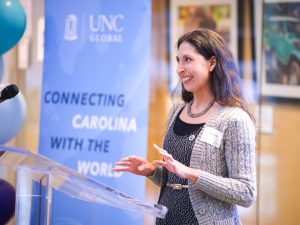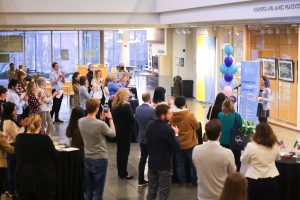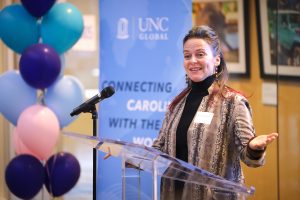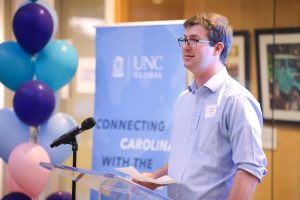Carolina Celebrates Fulbright Community at Fall Reception
December 6, 2022UNC Global Affairs

Fulbright visiting scholar Paz Cook delivers remarks. (Photo by Ken Huth)
UNC-Chapel Hill’s Fulbright community celebrated its shared commitment to cultural exchange at the Fulbright Fall Reception hosted by the Office of the Vice Provost for Global Affairs (OVPGA) on Nov. 16. Current and former Fulbright Program participants, including UNC-Chapel Hill and international faculty, staff, graduate students and scholars, gathered in the Florence and James Peacock Atrium of the FedEx Global Education Center.
“The Fulbright Program provides a tremendous opportunity for participating students and faculty to become better scholars, better problem solvers and better leaders,” said Barbara Stephenson, vice provost for global affairs and chief global officer. “These experiences can teach us so much about the world and about ourselves, and the program was really founded with that dual purpose in mind.” Stephenson, a former U.S. ambassador, has witnessed firsthand the benefits of the Fulbright Program.

Administered by the U.S. Department of State, the Fulbright Program fosters mutual understanding between the United States and partner nations through educational and cultural exchange. Through a variety of competitive awards, the program selects students, scholars, artists, teachers, and professionals to study, teach, pursue research and professional projects internationally, and serve as ambassadors of their home countries. The reception was organized during International Education Week, a joint initiative of the State Department and the U.S. Department of Education “to promote programs that prepare Americans for a global environment and attract future leaders from abroad to study, learn and exchange experiences.”
Thomas Lasater, OVPGA’s newly appointed program coordinator, is dedicated to building a greater sense of community for visiting Fulbright scholars. Lasater highlighted their volunteer work, contributions to cutting-edge research, time spent teaching foreign languages and engagement in campus life. “Together, you play a critical role in connecting Carolina to the world and making our University the place to be when it comes to the collaborative pursuit of global solutions,” said Lasater.
UNC-Chapel Hill currently hosts nearly 30 Fulbright students and scholars. The group represents 18 countries and more than 16 academic disciplines.

Alison Friedman, executive and artistic director for Carolina Performing Arts, received a U.S. Fulbright Fellowship to study in China in 2002 and spoke at the reception. She joined UNC-Chapel Hill last fall following 20 years leading performing arts institutions in China—a career launched by her Fulbright award.
“We need more than ever to look at the broader, complex, multifaceted and often contradictory perspectives and lived experiences in these vast global issues and context,” said Friedman in her remarks. “This is why international travel and study is so vital for Carolina and for our future leaders and workforce.” Friedman regarded the Fulbright Program as a life-changing experience.
Paz Cook, a Fulbright visiting scholar from Chile and a Ph.D. candidate at the Gillings School of Global Public Health, is eager to apply what she has learned from her research on cancer care to reduce health disparities in Latin America. She shared her sentiments on the importance of cultural exchange.
“We have the power to be ambassadors for our country and change the world around us,” said Cook. She also expressed gratitude for the opportunities Fulbright’s provided for her and her family to experience cultural exchange and become part of the Carolina community.
In recent months, Cook and fellow Fulbrighters at UNC-Chapel Hill have organized musical performances, food festivals and cooking workshops, game nights and other cultural exchange programs. Others have engaged in local volunteer work, serving with organizations such as Habitat for Humanity and the Piedmont Health Services WIC Program.

Lasater believes there is an exciting opportunity to strengthen the UNC-Chapel Hill Fulbright network.
“The goal is to nurture community and bring together Fulbright visitors, whether students, researchers, scholars or teaching assistants,” said Lasater. “We want to ensure all participants thrive beyond the classroom and the lab.” The reception is one of the first steps in formalizing a support system.
In addition to organizing Fulbright-specific events, Lasater is collaborating with UNC-Chapel Hill’s International Student and Scholar Services on events like FIFA World Cup Watch Parties. He also hopes to facilitate a speaker series featuring Fulbrighters on campus and at area schools to promote the local and global impact of the program.
At the reception, Lasater encouraged Carolina faculty to pursue Fulbright awards. Recent faculty alumni have received Fulbright awards for their work in Ecuador, France and Japan, and many who have returned to UNC-Chapel Hill after a Fulbright experience continue to collaborate with their Fulbright hosts.
The UNC Center for Faculty Excellence provides resources for faculty pursuing a Fulbright scholar or specialist award with application assistance, information sessions, and one-on-one consultations across the year. Tony Hackney, recently appointed Fulbright faculty liaison and professor of exercise and sports science, is available to assist those interested in applying.
The Fulbright Program was established by the U.S. Congress in 1946 based on legislation introduced by J. William Fulbright, a former U.S. senator from Arkansas. The Fulbright visitor programs, which bring international graduate students and teaching assistants to UNC-Chapel Hill, and the Fulbright U.S. student and scholar programs, designed for faculty and students to teach and conduct research abroad, fall under the overarching Fulbright Program umbrella and are federally funded.
